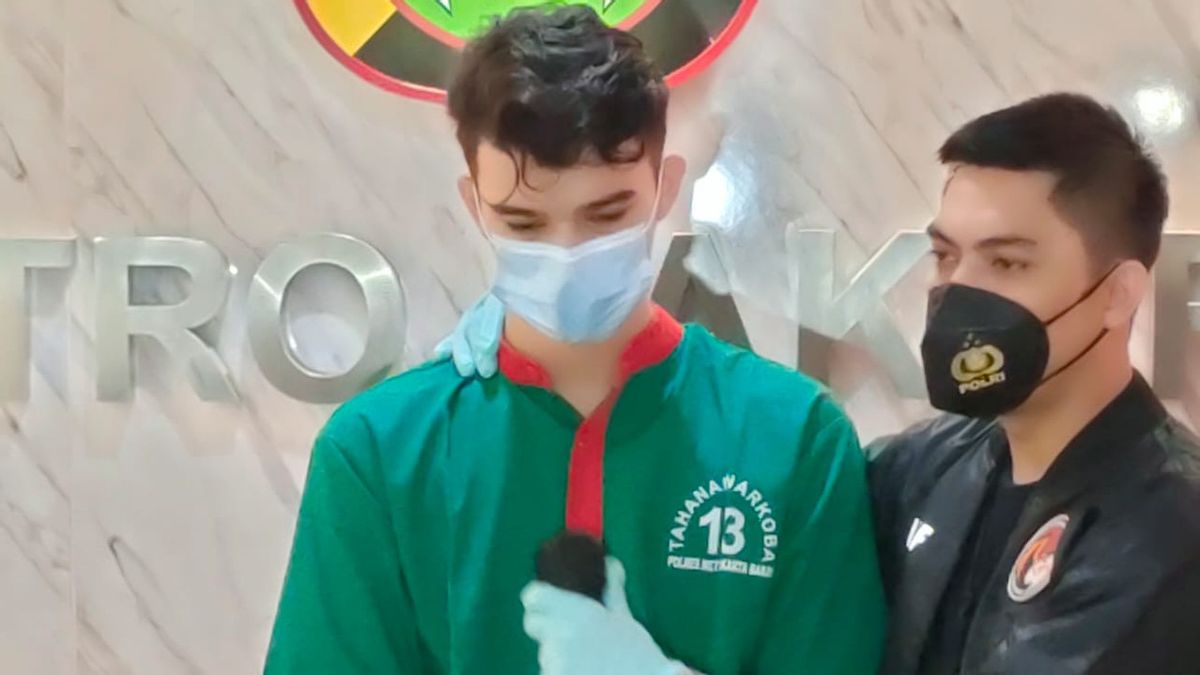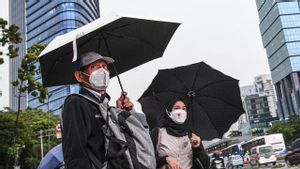JAKARTA - Young actor Jeff Smith was arrested for the use of the cannabis plant. The testimony moved him. Jeff Smith argues that the classification of marijuana as a Class I narcotic is wrong. This shows that imprisonment does not necessarily erode facts and turn off reason about the benefits of marijuana and the issue of criminalizing this plant.
Testimony was conveyed by Jeff Smith, when --as usual - the police were asked to apologize to the public. Monday, April 19, at the West Jakarta Police Headquarters, with a police officer pointing a microphone at him, Jeff Smith spoke the words:
I want to apologize to my extended family and my loved ones. And also I want to apologize to all Indonesian citizens because I have become a bad example and I have done things that are not exemplary.
After delivering a police briefing, Jeff Smith expressed his personal opinion. He criticized the classification of the cannabis plant as a class I narcotics. Jeff Smith also urged the government to immediately conduct research on cannabis.
"Furthermore, in my opinion, marijuana does not deserve to be categorized as a class one narcotics. As soon as possible, Indonesia must conduct research," said Jeff Smith.
[SERIES WRITING: Don't Panic It's Organic]
What can we see from Jeff Smith's testimony?
First, the matter of 'sorry titles' which has recently become a police habit. This habit should be stopped. The Sativa Nusantara Foundation (YSN) is one of the highlights of this.
Apart from not being legally obliged, positioning narcotics users, including marijuana as prisoners, is contrary to the perspective of Law Number 35 of 2009 concerning Narcotics, which sees users as victims.
"Law enforcement often presents celebrities who use narcotics, including marijuana, as prisoners who must apologize to the public. This is seen in many cases: Nunung, Tora Sudiro, Lucinta Luna, Dwi Sasono, etc. This is not obligatory. by law and should not be enforced. We think this habit should be stopped, "YSN Director of Law and Policy Yohan Misero, quoted by VOI, Wednesday, April 20.

Apart from the matter of apology, Jeff Smith's testimony also raises an important issue regarding the classification of narcotics. This regulation is still considered far from perfect. A review is needed to classify narcotics groups I, II, and III.
Classification of marijuana as a class I narcotics is not only criminalization but also ignorance of knowledge. This classification automatically closes the door to research and efforts to use marijuana in a strategic and ideal way.
"The placement of cannabis, with its various species and derivative substances in narcotics class I as something that is very problematic. Marijuana with all its potential cannot be used for medical and other industries. In the current economic situation, the use of cannabis as an asset under a legal scheme, according to us, very much deserves to be considered, "said Yohan Misero.
And the most important thing from Jeff Smith's testimony is that we see that imprisonment has not killed Jeff Smith's reasoning about marijuana. The logical and scientific fact that the five-finger plant has many benefits cannot be covered up by attempts to criminalize it.
"It's a fighter (Jeff Smith)," Dhira Narayana, Chairman of the Indonesian Cannabis Circle, told VOI, Wednesday, April 20.
[SERIES WRITING: Don't Panic It's Organic]
[/ read_more]
Cannabis use and changes in world regulations

The use of marijuana is increasingly being carried out. Last December 2020, the United Nations (UN) Commission even unanimously removed marijuana from the list of the most dangerous drugs in the world.
This is good news for all efforts to use marijuana in the world. This UN recognition is an important beginning to legitimize the benefits of marijuana, especially for health.
The United Nations Narcotics Commission approved the World Health Organization (WHO) recommendation to remove cannabis and cannabis resin from Agenda IV under the 1961 Single Convention on Narcotics. The designation of cannabis under Agenda IV places marijuana and its derivatives in the same category as heroin and other opioids.
Substances classified as Agenda IV are part of the list of drugs in Agenda I. By that classification, marijuana is considered not only "highly addictive and highly criminalized," but also labeled "extremely dangerous and of very limited medical or therapeutic value."
"This is good news for the millions of people who use cannabis for therapeutic purposes and reflects the realities of the growing market for cannabis-based medicinal products," a group of drug policy advocacy organizations said in a news release.
[SERIES WRITING: Don't Panic It's Organic]
[/ read_more]

A vote held on Wednesday, December 2 ruled that marijuana and cannabis resin were no longer classified as the most dangerous substances and recognized as having medical benefits. But they are still subject to the restrictions under the Agenda I category.
"We welcome the long overdue recognition that marijuana is a drug," Ann Fordham, executive director of the International Consortium on Drug Policy, said in a statement. "However, these reforms are far from adequate given that marijuana remains wrong at the international level."
In Indonesia, the UN decision was immediately responded to by a number of organizations. Through a civil society coalition they filed a judicial review of Article 6 and Article 8 of Law 35/2009. In their demands, the coalition encourages Indonesia to respond to the UN decision.
"Changes in international regulations on the use of medical marijuana last year at the United Nations, as well as the inherent authority of the Ministry of Health under Article 6 paragraph 3 of the Narcotics Law to change classes, we hope that the government and parliament can welcome the opportunity for this change more quickly and openly," the Director of Law and Yohan Misero's Sativa Nusantara (YSN) Foundation Policy.
* Read other information about LEGALIZATION OF GANJA or read other interesting articles from Rizky Adytia Pramana and Yudhistira Mahabharata.
BERNAS Others[/ read_more]
The English, Chinese, Japanese, Arabic, and French versions are automatically generated by the AI. So there may still be inaccuracies in translating, please always see Indonesian as our main language. (system supported by DigitalSiber.id)













